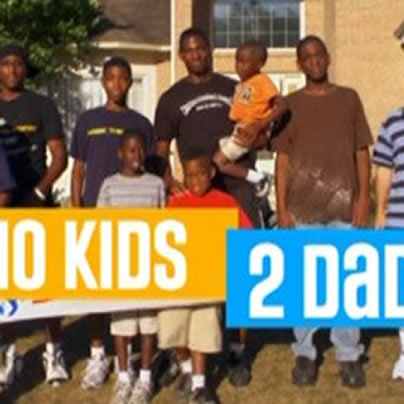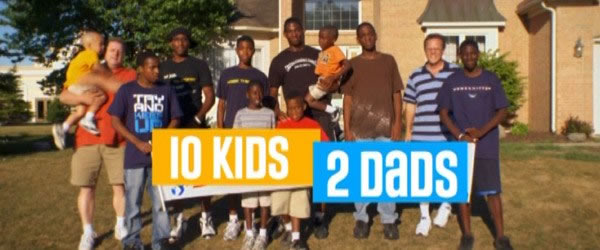Living
10 kids, 2 dads
Gay couple takes Father’s Day to a whole new level


Clint McCormack and Bryan Reamer are raising 10 kids in Michigan. (Photo courtesy the couple)
Trying to do a phone interview with Clint McCormack and Bryan Reamer, the two parents who were featured in OWN’s “10 Kids, 2 Dads” reality special last year, is a lot like trying to get honey out of a bee-lined hive. You’re not going to have an easy time of it. One kid comes in asking about food, another interrupts to talk about schoolwork, a third has just awoken from a nap and wants attention.
Still, somehow, the dads manage to live in this sort of controlled chaotic environment and create a loving family atmosphere where everyone is happy.
As a committed gay couple living in suburban Michigan, the couple knew they wanted to start a family, but 10 kids and nonstop commotion wasn’t exactly what they had envisioned.
What might seem crazy to most just felt right to the Farmington Hills couple, that originally set out to adopt just one child before eventually winding up with their 10 boys. McCormack comes from a family of six children while Reamer has just a brother, but both wanted to raise a family.
“We never intentionally wanted to adopt 10 children; it was the furthest thing from our minds,” McCormack says. “We thought maybe two or three max, but it just happened.”
After looking into foster children originally, McCormack found a place where they would be connected with birth mothers and in 1998, they adopted Keegan at his birth. Not satisfied to have an only child, a year later, they decided to look at adopting another child.
McCormack next found an agency in New Jersey to help the couple be matched with a child who could be a sibling to Keegan. Instead of one, the agency offered twins, Kenny and Mark (now 19).
“I decided to wait until I got the paperwork until I said anything to Bryan,” McCormack says. “Initially, he was a little wary of it, but we took the next step and met them and decided to proceed.”
No sooner was the twins’ adoption finalized when they got another call from the agency about a 3-year-old who they couldn’t find a home for. A caseworker came to their home, dropped off the kid and said, “I’ll see you on Sunday,” and then just left.
“He was not saying anything and I called Bryan and told him to hurry home. I noticed his diaper was wet and when I went to change it, I noticed he had leg braces on. I was never told that,” he says. “We brought him to a pediatrician the next day. He was really frail and going home, I was crying, saying I couldn’t adopt him because he’s going to die on us, and what would that do to our kids and I couldn’t handle it.”
Reamer knew that they couldn’t send him back. Being the more practical of the pair, he laid out his case that if they brought him back, he would die and the boy needed their love. Not long after, Caleb became son number four. Today, their “miracle kid” is walking normally and loving life.
“I thought our family was complete at that point,” McCormack says. “Maybe a year later, we got another call.”
The situation presented to them was that the agency had three brothers and they couldn’t find a home that would take in all three. They wanted Reamer and McCormack to consider adopting them, because if they didn’t, they would have to be split up.
“I called Bryan right away and told him they were going to split these kids up, and they were 7, 8 and 9, and you can’t do that to a kid. So, we started the whole process again,” McCormack says. “That’s how we got Seth (now 17), Garrett (now 18) and Graeme (now 19).”
With seven boys in the house, all becoming young men, McCormack started to yearn for the patter of little feet around the home again. He really wanted a baby — and a girl. The latter wouldn’t happen, but over the next few years Hayden (now 6), Liam (now 8) and Cooper (now 4) joined the family.
Before any of their adoptions went through, the couple asked themselves three questions:
“Can we do it financially? Can we do it physically? Can we do it emotionally?” Once an honest yes could be agreed upon, they knew it was in the cards.
“We are not adopting any more children,” McCormack says. “We have been offered two more children but we’ve turned them down. We are talking about what we want to do when we retire and stuff, and it’s like no more kids.”
The family lives in a four-bedroom house with two-and-a-half baths, and the oldest boys are currently in college and ready to move out. All the children have cell phones except the two little ones and they all constantly stay in touch with one another so everyone is always accounted for — at least as best you can with teenagers.
The two play to each other’s strengths to keep their home running smoothly. McCormack (or Papa as the kids call him) takes on the role of homemaker and chauffeur, while Reamer (Daddy) helps with homework and sports and is the disciplinarian of the household.
Reamer says his favorite thing about being a dad is when one of the younger kids comes up to him unsolicited and gives him a hug and kiss and says, “I love you Daddy.”
“Or when one of the older kids asks an interesting question. It gives me the opportunity to present different answers depending on situations,” he says. “This challenges them to broaden their scope of possibilities to evaluate when coming to a conclusion about something.”
Then he enjoys a lot of other dad-type things like sledding or attending sporting events.
“We always wanted children and when you want something, you make it work,” McCormack says. “We have really good kids. We were told things about their past where other people may have run away from, but we are very lucky.”
Think your life is consumed with kids’ activities? Imagine what McCormack and Reamer go through over the course of a week. There are sports, music lessons, school functions, community events, driving tests, play dates, doctor’s appointments and even college visits. And a lot of trips to the grocery store.
“I spend my days as a taxi driver,” McCormack says. “I try to remember everything but sometimes things fall through the cracks. Some have work, some have school, some have sports. I know where the kids are all the time, but I’m constantly being reminded I need to be here or there at a specific time.”
During the song “It’s a Hard Knock Life” from the musical “Annie,” there’s a lyric that goes, “Santa Clause we never see, Santa Claus what’s that, who’s he?” It’s something that hit very close to home for the two dads when they were first adopting their family.
“When we adopted our three together they didn’t know what birthdays were, they didn’t know what Christmas was, they didn’t know what Thanksgiving was, and they were 7, 8 and 9,” McCormack says. “They never experienced holidays. I was so dumbfounded that there are children in the states who don’t get anything for Christmas or experience Thanksgiving or Easter.”
Because of that, every Christmas the two dads and their 10 sons provide as many Christmas presents to foster children as they can through their foundation, Cee Bee Enterprises. Last year they provided gifts to more than 145 kids.
You would think that having 10 boys in the house would put a strain on the couple’s love life, but Reamer says that he and McCormack plan time together each day and still find time to do things away from the kids.
“We go out to dinner on Friday night and we have another home and our children are old enough where we can go up to our cottage for a weekend and the older ones can watch the littler ones,” he says. “We check on them constantly.”
As for the show on the Oprah Network, McCormack says it was a fun experience for everyone involved. Primarily shot in April 2012 in their former Canton home, the special chronicles the McCormack-Reamer family’s daily life, which includes all the madness you’d expect from a 12-person, two-dog household.
“Our reason for doing it was to show people that you can get great kids out of foster care,” he says. “We wanted people to see that it’s just like everyone else’s family.”
Advice
How to cope when a partner gives you the silent treatment
Punishing behavior brings up memories of parent’s mistreatment

Michael,
My wife and I met less than two years ago and we were crazy about each other from the start. We wanted to spend life together so we just went for it. Maybe this wasn’t the most well-thought out decision on either of our parts but we thought that love conquers all.
But lately we’ve been arguing. The stuff we’re fighting about is never such a big deal: chores, or spending, or wanting to do different things on the weekend. But when I don’t want to go along with Michelle’s point of view, she gets angry and shuts down. Sometimes she stops talking to me for as long as a few days.
This is painful for me. My mom used to pull this stunt when I was a kid and she was mad at me. She also cut me off when I came out. We’re still estranged.
Michelle has a whole different take on this. She says I am being “mean” to her (when I don’t go along with what she wants) and this is painful, and she has to “take a break” to cool off.
I know she comes from a volatile family. She has told me there was a lot of screaming in her house, and she barely has a relationship with her parents as a result. So I get that she’s sensitive to conflict.
But I don’t think I’m being mean to her by standing up for what I want — certainly not enough to warrant her giving me the silent treatment.
We got married to have a great life together. We often do but I can’t live with someone who just shuts me out when she’s annoyed with me.
If I became a doormat and went along with everything she wants and never pushed back or complained, maybe she wouldn’t shut down. But I don’t want to do that.
I’d appreciate some ideas to improve the situation. I don’t want a divorce but I also don’t want to keep being mistreated.
Michael replies:
You can think of marriage — or any serious relationship — as a gym where you have ongoing opportunities to become an increasingly resilient person in the face of the ongoing challenges that an intimate relationship poses.
Your task here is to shift your focus toward figuring out how to handle yourself well, even in the awful circumstance of getting the silent treatment.
Michelle is not under an obligation to behave as you’d like her to. You can certainly ask her to stop withdrawing when she’s angry at you. But that doesn’t mean she is going to honor your request.
I well understand that Michelle’s punishing behavior is bringing up painful memories of your mother’s mistreatment. But if she doesn’t change her behavior, you have to find a way to live with Michelle as she is, with as much equanimity as you can muster, for as long as you choose to be married to her. If she does not change and you find her behavior to be unbearable, you can leave.
Every time she shuts down, Michelle is handing you an opportunity to figure out how you, yourself, can deal with feeling hurt and let down, rather than depending on someone else to behave as you’d like her to, or not upset you, or soothe you. Being in charge of your own mood rather than letting someone else press your buttons is a great skill to get better at.
I’m not going focus on what techniques you might use to soothe yourself — that’s a different column (or even better, a number of therapy sessions). That said, knowing that Michelle’s behavior comes from her history might help you to take it less personally. And, simply keeping in mind that living with a difficult spouse is unavoidable and worth getting better at may help you to quiet yourself down.
Another challenge that your marriage is pushing you to work on: Discerning when you can be generous, and when it is important to have a boundary. Of course, I understand that you don’t want to be a doormat by going along with whatever Michelle says and wants. But is it possible that she has a point, in that you could stand to lean more in her direction?
None of us get to have everything the way we want when we are in a relationship (much less in life). Figuring out the interplay between generosity and boundary is complicated. It often involves considering what is important to your partner; and deriving joy from her getting some of what is important to her, not only from your getting what you would like. And of course, it also involves figuring out what is most important to you.
If you set a boundary thoughtfully, because something is important to you, and Michelle doesn’t like it, you’re being handed an opportunity to get better at tolerating disappointment. Being a disappointment to your partner, and being disappointed in your partner, are both unavoidable parts of marriage: We’re all different, and at times will make choices that the other person really does not like.
If we make our decisions from a place of integrity rather than whim, entitlement, anger, or “whose turn it is”, and strive to honor the choices that our partners make from a place of integrity, this often makes the disappointment easier to bear.
Of course, it would be great if Michelle would join you in working to become a more solid and resilient spouse. As I mentioned earlier, you can’t persuade her to do so. But you can certainly tell Michelle what you are working on and ask her to consider how she, too, might use your relationship difficulties as a challenge to grow.
It isn’t easy to have such a conversation without sounding condescending. You are better positioned to do so when you are walking the walk, not just talking the talk. One good rule of thumb is to put you and your partner in the same boat, making it clear that you see the two of you as facing the same challenges, rather than positioning yourself in a superior position. Another is to initiate the conversation when you are both calm, rather than in the middle of a fight or when you’re getting the silent treatment.
One more point: If Michelle is willing, I’d suggest that you propose couples therapy as an opportunity for you two to collaborate on building a consistently loving relationship where neither of you lets your reactivity run the show.
Michael Radkowsky, Psy.D. is a licensed psychologist who works with couples and individuals in D.C. He can be found online at michaelradkowsky.com. All identifying information has been changed for reasons of confidentiality. Have a question? Send it to [email protected].

Electric-vehicle tax credits may have faded earlier this year, but EVs themselves are far from losing their spark. There are more charging stations than ever, battery ranges are longer and more realistic, and automakers have finally figured out that EVs don’t all need to look like geeky science projects or feel like failed beta tests.
Just look at these two compact electrics, which are futuristic, fun and flexible enough for work or play.
HYUNDAI IONIQ 5
$37,000 to $48,000
Range: 245 to 318 miles
0 to 60 mph: 4.5 to 7.4 seconds
Cargo space: 26.3 cu. ft.
PROS: Fast charging. Roomy cabin. Silky-smooth suspension.
CONS: Wide turning radius. Rear wiper not on all trims. Price creep.
After being introduced three years ago, what’s new for the latest Hyundai Ioniq 5? Mostly refinement. Charging is quicker, software is smarter and Hyundai continues to quietly listen to feedback, tweaking ride comfort and usability. Think of it as switching from messy eyeliner to a perfectly sharp wing.
Exterior styling remains one of this EV’s biggest conversation starters. Those pixel-inspired lights, crisp lines and slick hatchback-meets-crossover proportions exude refreshing confidence. There’s no trying to blend in, and that’s the point. Park this Hyundai anywhere and heads will turn.
On the road, the Ioniq 5 prioritizes calm over chaos. Steering is light, the suspension smooths out rough pavement and acceleration feels brisk without being aggressive. Safety tech is plentiful and well-calibrated—adaptive cruise control, lane-centering, blind-spot monitoring—all working together without seeming like a nervous backseat driver. IOW, this ride is supportive, not clingy.
Inside, the user-friendly cabin shines. The flat floor and long wheelbase create a lounge-like atmosphere, with excellent legroom and airy visibility. Seats are well-bolstered and available with eco-friendly materials, and the sliding center console adds flexibility. Cargo space is generous, and the wide windshield makes city driving stress-free. Alas, the rear wiper is only available on select models. Overall, though, I appreciated how everything looks modern without feeling cold.
What makes this Hyundai special is its vibe. An EV that embraces individuality without shouting about it.
Fun fact: The Ioniq’s ultra-fast charging can add hundreds of miles in under 20 minutes—perfect for those who hate waiting almost as much as they hate small talk on awkward first dates.
VOLKSWAGEN ID.4
$46,000 to $59,130
Range: 206 to 291 miles
0 to 60 mph: 4.4 to 7.7 seconds
Cargo space: 30.3 cu. ft.
PROS: Sure handling. Decent range. Good storage.
CONS: Body roll in curves. Fussy infotainment. No frunk.
The latest VW ID.4 focuses on polish. Software updates have fixed earlier frustrations, and overall drivability feels more cohesive. Less “learning curve” and more “hop in and go,” like a dependable bestie who doesn’t overthink things.
Styling-wise, this EV is intentionally inoffensive. Soft curves, friendly lighting and a familiar crossover shape make it approachable. While the ID.4 won’t turn heads like the Ioniq 5, that’s OK. It’s more akin to a classic outfit that always works—timeless, not trendy.
Driving the ID.4 is relaxed and predictable. This SUV prioritizes comfort over thrills, with a suspension tuned for daily commuting and long highway drives. Safety features are comprehensive and reassuring, including excellent lane assistance and collision-prevention systems. It’s the kind of car that quietly has your back, no drama required.
Inside, the ID.4 offers a calm, uncluttered cabin with good space for passengers and cargo alike. Rear-seat legroom is especially strong, making it a solid road-trip companion. The seats are plush, visibility is good and while the infotainment system isn’t the most intuitive, it’s improved enough to be more than tolerable.
The ID.4’s special sauce is balance. It doesn’t try to reinvent the wheel—it just electrifies it.
Fun fact: This is one of the most globally popular EVs, proving that sometimes being universally liked is a strength, not a personality flaw. Think, gold star gay who still surprises you.

Real Estate
Child- and pet-proofing your home for the holidays
It isn’t about being perfect but about being prepared

The holidays are meant to be joyful, cozy, and full of laughter — but if you have young children or pets, they can also feel a little chaotic. Twinkling lights, shiny decorations, guests coming and going, and tables full of tempting food can turn your home into a wonderland of curiosity and mischief. The good news? With a little thoughtful planning, you can keep the holiday magic alive while making your home safer for everyone who lives there.
There’s something oddly comforting about movies where animals go to war with holiday decorations, turning carefully strung lights and perfectly placed ornaments into chaos. Whether it’s a mischievous dog tangled in tinsel or a curious cat launching a full-scale assault on a Christmas tree, these scenes tap into a universal experience for pet owners.
The humor comes from the contrast: the human characters are trying to create warmth, tradition, and picture-perfect cheer, while the animals see the decorations as toys, obstacles, or personal enemies. The resulting destruction — trees tipping over, ornaments shattering, lights blinking out—feels exaggerated but relatable, especially during the already hectic holiday season.
Let’s start with decorations because they tend to be the biggest attraction. Ornaments sparkle, garlands dangle, and everything seems designed to be touched, pulled, or tasted. If you have little ones or pets, consider placing your most fragile ornaments higher on the tree and using shatterproof options on the lower branches. Tinsel and ribbon may look festive, but they can be dangerous if swallowed, so skipping them or keeping them well out of reach is a simple way to reduce risk without sacrificing style.
Holiday lights are another favorite fascination. Before hanging them, take a few minutes to inspect each strand for frayed wires or broken bulbs. Secure cords along walls or behind furniture so they’re harder to grab or chew and unplug them when you leave the house or head to bed. Not only does this help prevent accidents, but it also gives you one less thing to worry about during a busy season.
The Christmas tree itself can become a focal point for exploration. Make sure it’s sturdy and well-anchored so it doesn’t tip if a toddler tugs on a branch or a pet decides to investigate. If you use a real tree, cover the water base since tree water can contain additives that aren’t safe if consumed. For artificial trees, keep an eye out for loose pieces or needles that could become choking hazards.
Food is a big part of holiday celebrations, and it’s also one of the most common sources of trouble. Many traditional treats—like chocolate, grapes, raisins, alcohol, and foods containing xylitol—are dangerous for pets. Keep plates and serving dishes up high, secure the trash can, and gently remind guests not to slip pets or kids “just a little bite” without checking first. For children, be mindful of hard candies, nuts, and small treats that could pose choking risks.
Candles and fireplaces add warmth and charm, but they deserve extra caution. Flameless candles are a wonderful alternative if you want ambiance without worry. If you do use real candles, place them well out of reach and never leave them unattended. Fireplaces should always have a sturdy screen or gate, especially with crawling babies or curious pets nearby.
Holiday gatherings bring wonderful energy into your home, but they can also create new challenges. Doors opening frequently make it easier for pets to slip outside, so consider setting up a quiet, comfortable space where they can relax during busy get-togethers. This can help reduce stress for them and give you peace of mind. For children, stair gates, locked cabinets, and clear boundaries can help prevent accidents when there’s extra excitement in the air.
New toys and gifts are another thing to watch closely. Packaging, twist ties, plastic wrap, and especially button batteries should be cleaned up promptly. These items are easy to overlook in the excitement of gift-opening but can be dangerous if swallowed. Taking a few minutes to tidy up as you go can make a big difference.
Lastly, try to keep routines as steady as possible. The holidays naturally disrupt schedules, but familiar mealtimes, naps, walks, and bedtime rituals help children and pets feel secure. A calmer household often means fewer accidents and a happier experience for everyone.
At the end of the day, child- and pet-proofing your home for the holidays isn’t about being perfect but about being prepared. A few small adjustments can help you relax, enjoy your guests, and focus on what truly matters: creating warm, happy memories with the ones you love. When your home feels safe, the holidays feel even sweeter.
Valerie M. Blake is a licensed Associate Broker in D.C., Maryland, and Virginia with RLAH @properties. Call or text her at 202-246-8602, email her at [email protected] or follow her on Facebook at TheRealst8ofAffairs.
-

 Photos5 days ago
Photos5 days agoThe year in photos
-

 Sponsored4 days ago
Sponsored4 days agoSafer Ways to Pay for Online Performances and Queer Events
-

 District of Columbia3 days ago
District of Columbia3 days agoTwo pioneering gay journalists to speak at Thursday event
-

 a&e features3 days ago
a&e features3 days agoQueer highlights of the 2026 Critics Choice Awards: Aunt Gladys, that ‘Heated Rivalry’ shoutout and more




















